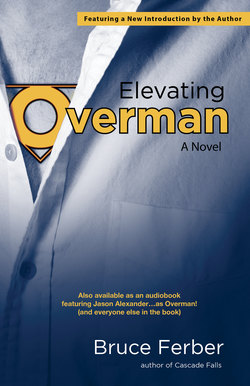Читать книгу Elevating Overman - Bruce Ferber - Страница 10
ОглавлениеI’m often asked why I left the glamorous world of television for the lonely and monetarily challenging path of writing novels. In fact, the career shift was a response to a profound and disturbing life experience. My wife was being treated for Stage 3 Breast Cancer while I was making the rounds of the networks, pitching sitcom premises to twenty-five year-old executives with no power to do anything but offer me bottles of water. One day, as I was listening to their ideas, I realized that I didn’t want their water anymore, both literally and metaphorically. The notion of trying to homogenize an idea to please these people had become anathema to me. So I walked away from TV cold turkey and devoted my time to being with my wife and kids—until Jenise lost her battle.
As I processed my grief, I started to wonder what I was going to do with myself. I was still relatively young, (though not by entertainment industry standards), I still had the drive to write comedy, but I was burned out on the TV process. More importantly, I knew that whatever I did next couldn’t be for anyone else, and would have to reflect who I’d become. I’d never written a novel before and didn’t know if I could, but sink or swim, I wanted out of my comfort zone.
I found Ira Overman, a man who has pissed away the first fifty-five years of his life and wants one more chance to make things right. Then one day, I went to my mailbox and pulled out a copy of the Pennysaver. On the cover was an ad for “Life-Changing Lasik Surgery—$299 per eye.” This became the engine for the novel. Overman, who has been wearing glasses since he was four, decides that even a small change, like improved vision, would be a step up from life as it stands. As it turns out, the Lasik not only makes him see better but see differently, empowering him to accomplish things he never thought possible. The change is so dramatic that his best friend, Jake Rosenfarb, becomes convinced that Overman has morphed into some kind of superhero, and Rosenfarb offers to be his sidekick.
While the book takes many comic twists and turns, it poses the essential question: How do we atone for our mistakes and gain insight into a life that matters? As I wrote a character who was searching for meaning and granted a second chance, I began to realize that Overman’s journey was paralleling my own. After my wife’s passing, I, too, was contemplating a second chance, albeit one I never wanted to take. I struggled with why bad things happened to good people. Overman wondered why good things were happening to a schlub like him. The further I dug into the writing, the more our paths started crisscrossing, which frightened me, given Overman’s pathetic track record. But as his character started to blossom, I began to take heart. I suddenly realized that this flawed, middle-aged Jewish man from my imagination had given me my second chance.
